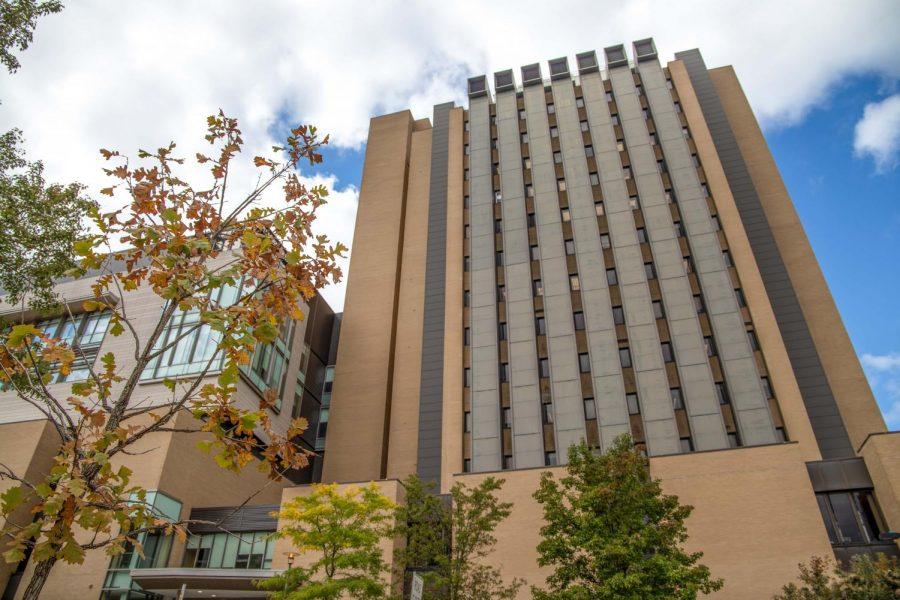Dietrich stockroom helps provide PPE across campus
Lucas Zheng | Staff Photographer
Pitt’s PPE stockroom expanded from a storage space in the Chevron Science Center to a second warehouse.
October 12, 2020
As the nation continues to churn through personal protective equipment, providing supplies for a university as large as Pitt during the COVID-19 pandemic has proven to be a challenge.
Though the stockroom for the Dietrich School of Arts and Sciences typically handles orders for lab protective equipment, it now oversees purchasing and distribution of all PPE across campus. Pete Chambers, director of shared research support services, said the sales and amount of work the stockroom has been doing this year has skyrocketed. There has been an estimated three million dollars in sales so far this year, he said.
“We normally do probably about a million dollars a year in sales,” Chambers said. “Orders for supplies like gloves haven’t increased because they aren’t a part of Pitt’s COVID mitigation plan, but disinfectant orders have been zero to 100.”
Despite the stress in maintaining a tight inventory, Chambers said the hard work is well worth it.
“When this started, and they were trying to do the research restart, I was putting in 78-hour weeks trying to get this stuff together,” Chambers said. “I can’t say enough good things about the work [my team and my colleagues] did, and the movers too.”
For the last several months, the stockroom’s team has been ordering masks, disinfectants and other equipment needed around campus. The group has been handling orders for all COVID-19 mitigation supplies for the entire university, distributing it and tracking costs.
“Inventory control is what [Dietrich School Stockroom] is set up to do,” Pitt spokesperson Pat McMahon said. “All of the policies, procedures and systems have been able to successfully incorporate this work.”
Pitt made all COVID-19 mitigation supplies free of charge and kept track of all used PPE and face masks from May 25 to Sept. 30. These products are available upon request from PantherExpress, the University’s internal purchasing portal. According to Chambers, the purpose of making all of the supplies free was to facilitate the restart of research on campus.
As masks grow in demand throughout the pandemic, cloth masks and other alternatives have become increasingly popular, Chambers said.
“Provost [Ann Cudd] bought 70,000 masks to distribute to students, faculty and staff,” Chambers said. “We bought a million and a half disposable masks and we need to put in another order soon. We were able to get four boxes of N95 masks which all went to COVID-19 [research] testing.”
Buying disinfectants by the gallon for the entire University has been a new challenge and suppliers, such as Fisher Scientific, have been selling out quickly. According to PantherExpress, Pitt plans to make “barrier masks, gloves, cleaning supplies, disinfectants [and] face shields” available for the student body, faculty and staff.
This year, the stockroom expanded from a storage space in the Chevron Science Center to a second warehouse in Bakery Square. They have also hired more people to help manage the influx of orders. The majority of the supplies in the stockroom are sent to labs in the schools of Medicine, Arts and Sciences, and Engineering.
“Even gloves have been hard to come by, which have all gone to chemistry and clinical labs,” Chambers said.
Pitt’s facilities management team handles orders for COVID-19 mitigation supplies such as wipe or spray bottle disinfectants, as well as hand sanitizer, in the areas it is responsible for cleaning. Meanwhile, departments order supplies for areas they manage on their own.
“The stockroom staff packs the orders, which are then delivered throughout campus by Parking, Transportation & Services,” McMahon said.
The hardest part for the stockroom has been getting supplies, officials said. Typically the University only had one supplier for most protective equipment, but there are eight extra suppliers this year. Working with a total of nine companies during the COVID-19 pandemic for mitigation supplies has required a lot of flexibility on the stockroom’s part.
“An open line of communication with these suppliers, responding very quickly and nimbly to spot buy opportunities, tracking shipments and paying timely have resulted in good relationships with our existing and new suppliers.” McMahon said.
The University has been using Fisher Scientific and has preferred buyer status with them. Pitt has primarily used Fisher due to its history of trustworthy product sourcing — Chambers said Fisher canceled an order this year from China after finding out they used child labor.
First-year psychology major Naomi Brotman said it’s important for the University to support safe research practices for lab workers.
“I think it’s really important to be getting masks and PPE to the people doing research all over campus especially for COVID-19 research,” Brotman said. “Being a research university too, I’m happy to know we are prioritizing research.”
Pitt also distributed hand sanitizer, disinfecting wipes and face masks to RAs across campus. Ally Colgan, a first-year nursing major, said she saw students wearing Pitt-branded reusable masks all over campus.
“When we first got to campus we were given two Pitt masks. I feel really safe knowing how much work is being done by Pitt and by the stockroom,” Colgan said. “Even though I won’t be buying from the stockroom, knowing there are people in charge of getting [COVID-19 mitigation supplies] for the school is important.”
The University has distributed all COVID-19 mitigation supplies for free through a potential reimbursement by the Federal Emergency Management Agency. In order to be reimbursed by FEMA, the agency does not allow more than a two-month supply of emergency equipment such as PPE.
“You have to have pretty tight inventory controls,” Chambers said. “To be able to show the government, this is where we bought this, these are the users … that’s where it went, stuff like that.”








